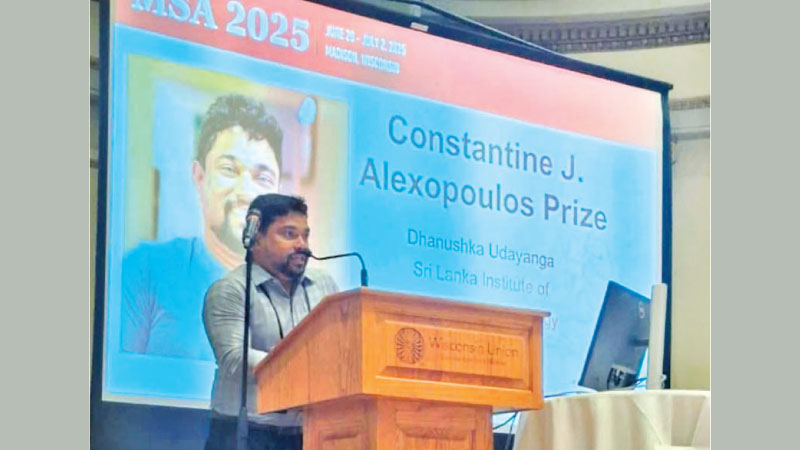SLIIT is proud to celebrate the remarkable achievement of Professor Dhanushka Udayanga, who has been awarded the CJ Alexopoulos Prize by the Mycological Society of America (MSA). Professor Udayanga, affiliated with the Department of Applied Sciences at SLIIT, is an accomplished molecular biologist and mycologist whose pioneering work in fungal taxonomy, diversity, and ecology has gained international acclaim. In 2024, he joined SLIIT as a Professor and continues to lead innovative research while mentoring the next generation of fungal biologists. Following is a brief interview with him regarding his recent achievement
Q: Can you tell us a bit about what the CJ Alexopoulos Prize is and why it is considered important in your field?
The C.J. Alexopoulos Prize, named after an iconic American Mycologist Constantine John Alexopoulos (1907–1986) is a prestigious earlycareer award presented by the Mycological Society of America (MSA). The MSA is a professional scientific organisation dedicated to the study of fungi in all their forms, including mushrooms, molds, yeasts, lichens, and plant pathogens. This award has initiated since 1978 and about 45 well-known mycologists were annually awarded since then mostly, from United States and Canada.
 Q: What kind of work or achievements does someone need to have to receive this award?
Q: What kind of work or achievements does someone need to have to receive this award?
It recognises a rising mycologist for outstanding contributions in the field nominated by a MSA memberand endorsed by up to 5 scholars, typically judged on the quality, originality, and quantity of their research by the MSA distinction panel.
Q: How did it feel when you found out you had won this international recognition, and what kind of effort and dedication went into reaching this point in your career?
I was truly honored to receive this prize. It’s especially meaningful as someone conducting research outside the U.S., having navigated many academic and research challenges along the way. My journey in mycology has been purpose-driven, with a strong focus on applied outcomes both locally and globally. The advanced training I received during my PhD and postdoctoral work in Thailand, China, and the U.S. has been instrumental in shaping my research direction. What sets my work apart is a consistent commitment to impactful research, mentorship, and outreach, even within challenging academic environments. These efforts have helped define my path and gain recognition within the early-career mycology community.
Q: What does this recognition say about the quality of education and research happening in Sri Lanka, especially at institutions like SLIIT?
It truly demonstrates the potential for scientists in institutions like SLIIT or any other Sri Lankan institutions with similar capacity to excel in the international arena, though continuous engagement in impactful research, collaborations and outreach.
Q: How do you see this achievement contributing to the academic profile and global recognition of SLIIT as a research-driven institution?
Although based in the United States, the MSA has a truly international membership, with scientists from around the world contributing to and benefiting from its resources. It is also a member of larger umbrella organisations like the International Mycological Association (IMA).
This is a great opportunity for SLIIT to place it among the universities that have remarkable track records in this field of study. That can foster the expansion of research capacity in collaboration with both local and international institutions.
Q: What message would you give to students or young researchers at SLIIT or in Sri Lanka who aim to pursue a similar global impact in science?
In research, there are no shortcuts. Research consists of a larger extent of failure than success.
Therefore, genuine enthusiasm, sustained engagement, and resilience are essential to becoming a globally known scientist.
However, every passionate individual holds the potential to make a meaningful global impact. Therefore, we should never give up on your curiosity, creativity, and innovation and always strive to do our best to the betterment of human life through practice.
Q: Could you share any upcoming goals or research projects that you’re excited about following this milestone?
I’m excited to advance my ongoing projects in foliar fungal pathogens, mycelium materials, mushroom biotechnology and bioinformatics applications of fungi in collaboration with both local and international scientists and organisations.
I warmly welcome industry partners, researchers, students, volunteers and other collaborators to join hands in this exciting scientific journey to bring the best impact and recognition to the country.
SLIIT proudly congratulates Professor Dhanushka Udayanga for this significant milestone in his research career.








